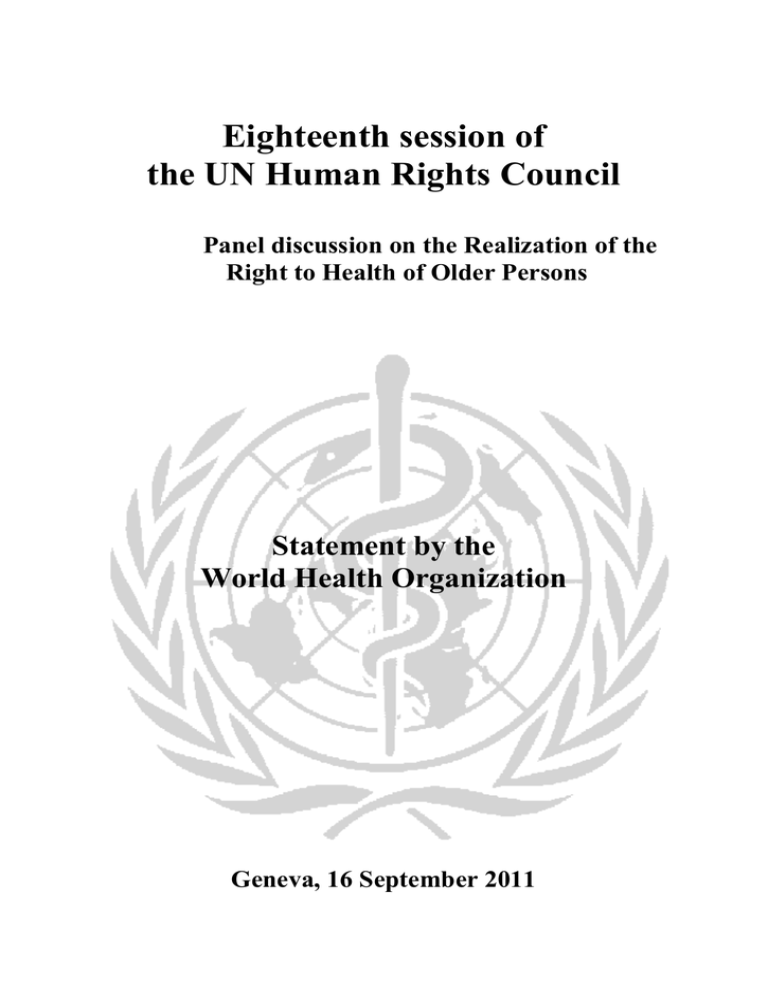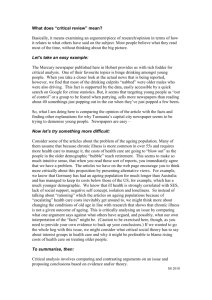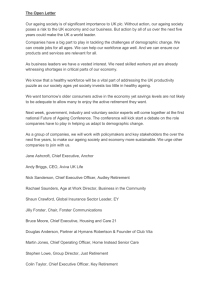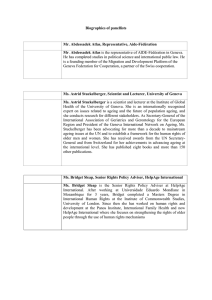Eighteenth session of the UN Human Rights Council Statement by the
advertisement

Eighteenth session of the UN Human Rights Council Panel discussion on the Realization of the Right to Health of Older Persons Statement by the World Health Organization Geneva, 16 September 2011 Thank you, Chair, The World Health Organization is honoured to be part of this important panel. Let me start by congratulating the UN Special Rapporteur on the Right to Health, Anand Grover, for his comprehensive report. In almost every country, the proportion of people aged over 60 years is growing faster than any other age group, as a result of both longer life expectancy and declining fertility rates. Population ageing represents a major achievement. Yet it provides us not only with opportunities but also with a number of challenges. A key challenge, deeply rooted, is the ingrained stigma and discrimination- the ageism- which many older people are subjected to. Ageism generates exclusion and disadvantage, leading to the denial of a range of rights, which affect health, such as access to nutritious food, water and health-care. In its most extreme, ageism manifests itself in abuse, violence and neglect. Initially, seen as a social welfare issue and subsequently a problem of ageing, abuse of the elderly is emerging as a public health issue. Initiatives to address child abuse and domestic violence in the last quarter of the 20th century have helped reveal what was considered a private matter. In many places, elder abuse still remains hidden and is considered taboo. The WHO World report on violence & health framed elder abuse as a violation of human rights and demonstrated how it is a significant cause of injury, illness, lost productivity, isolation and despair. So with all this doom and gloom, where lies the opportunity? The opportunity we have before us is to change negative attitudes towards older persons in our societies and to harness the contribution of older persons. In this context, WHO is promoting "active ageing". What do we mean by this? Consistent with a human rights based approach it does not only address the outcome - what we want to achieve- which is better health and quality of life. It also considers the principles that must guide us there. The right to participate is central. And the word “active” refers to continuing participation in social, economic, cultural, spiritual and civic affairs, not just the ability to be physically active or to participate in the labour force. Good health is the key. At the same time, older people who retire from work, are ill or live with disabilities can remain active contributors to their families, peers, communities and nations. Active ageing aims to extend healthy life expectancy and quality of life for all people as they age. Note that I say, "all people as they age". Rather than defining who is "old", we have adopted a life-course approach, which looks at the progressive change in the physical, mental and social structure of individuals. This means, we need to address the health needs and rights of people at all stages of life - from pregnancy, birth, childhood, adolescence, through adulthood to older age. This brings me to the notion of "security", another pillar of "active ageing". Transforming the perception of older persons from a burden to a resource requires recalling the commitment to freedom from want, as set out in the Universal Declaration of Human Rights, alongside freedom from fear. The right to a standard of living adequate for health and well-being, including medical care and necessary social services is set out in the UDHR. WHO's 2010 World health report on health systems financing supports countries in translating this commitment into practice. Importantly, it demonstrates that compulsory prepayment provides the most efficient and equitable path forward. Avoiding direct payments for health care will facilitate the ability of older people to access prevention, treatment and care. Of course, there are numerous other barriers to access such as gender, beyond what we call in "Right to Health terms" economic accessibility, i.e. affordability. Distance and transport costs also play a role. In response, WHO promotes community-level primary health care for older people as crucial to promote health, prevent disease and manage chronic illnesses. Unfortunately, however, training for health professionals includes little if any instruction about care for the elderly. This needs to change as health care workers will increasingly spend time caring for older persons. Mental health issues including dementia and depression and noncommunicable diseases (NCDs) deaths are expected to rise substantially as populations age. 36 million of the 57 million global deaths each year are due to NCDs, mainly cardiovascular diseases, cancers, chronic respiratory diseases, and diabetes. Nearly 80 percent of these deaths occur in low and middle-income countries. Next week, at the General Assembly in New York, Member States are negotiating a political declaration on how to prevent and control NCDs. Common risk factors identified are tobacco use, unhealthy diets, harmful use of alcohol and physical inactivity. Addressing these requires strong government leadership underpinned by the obligation of the government to respect, protect and fulfil the right to health. The current draft political declaration being negotiated does recognize this link between the prevention and control of NCDs and the full realization of the right to health. To conclude, to change the perception of older persons, we need to shift the paradigm from "responding to the needs of older persons" to "realizing the rights of older persons". Let me thank you again for inviting WHO to this panel. WHO looks forward to working with all of you in realizing the rights of older persons and we invite you to celebrate World Health Day, April 7, next year, with us which is dedicated to the theme of ageing and health. Thank you.



